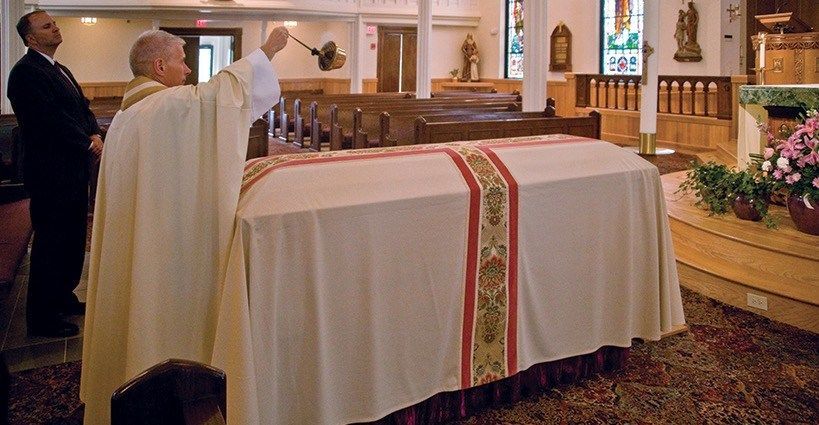If a loved one has died, please contact the church office to arrange a time to meet to discuss the funeral.
Our Catholic faith teaches that death is not the end but rather the beginning of new life. Death is a time of grief, of hope and of expectations, not only for the immediate family of the deceased, but also for the parish family. The funeral is a time to acknowledge and to respond to a change that has taken place. It is a time for family, friends and relatives to pay their respects to the deceased and give comfort to the family survivors.
The Funeral Liturgy consists of 3 parts:
The Vigil for the Deceased (Wake). Gathering in the presence of the body, the mourners come together either in the home of the deceased, the parish church, or the funeral home to comfort one another with the assurances of faith. It is during the Vigil that words of remembrance are especially appropriate as well as the celebration of the life of the departed.
The Mass of Christian Burial (also called the Mass of Resurrection). The Holy Sacrifice of the Mass is the greatest prayer we can offer on behalf of those we love. Here the Church celebrates the mystery of the passion, death and resurrection of Christ and recognizes the deceased Christian’s participation in that mystery. The symbols used at a funeral mass are the same ones used at the person’s baptism. By this, we recognize their birth into eternal life.
The Burial (Committal). Gathering at the grave site, the people gather for one last time to bless the grave and to commit the mortal remains of the deceased into the ground or a suitable tomb. Here the beloved dead will await their own resurrection when Christ comes in glory.
Funeral arrangements are ordinarily made by the family members who contact the Pastor to conduct the services.
A Word About Cremation
A recent document released from the Holy See in August 2016 stated, “The Church raises no doctrinal objections to the practice of cremation, since cremation of the deceased’s body does not affect his or her soul, nor does it prevent God, in his omnipotence, from raising up the deceased body to new life. Thus cremation, in and of itself, objectively negates neither the Christian doctrine of the soul’s immortality nor that of the resurrection of the body.” This document affirms the permissibility of cremation if it is not done for reasons contrary to the Faith. The current teaching on cremation, therefore, is that body burial is preferred but cremation is permitted. Cremation may be preferred because of “sanity, economic or social considerations.” It should be noted that the Church requires that the cremated remains be buried and not scattered, not should the ashes be worn in a keepsake.

